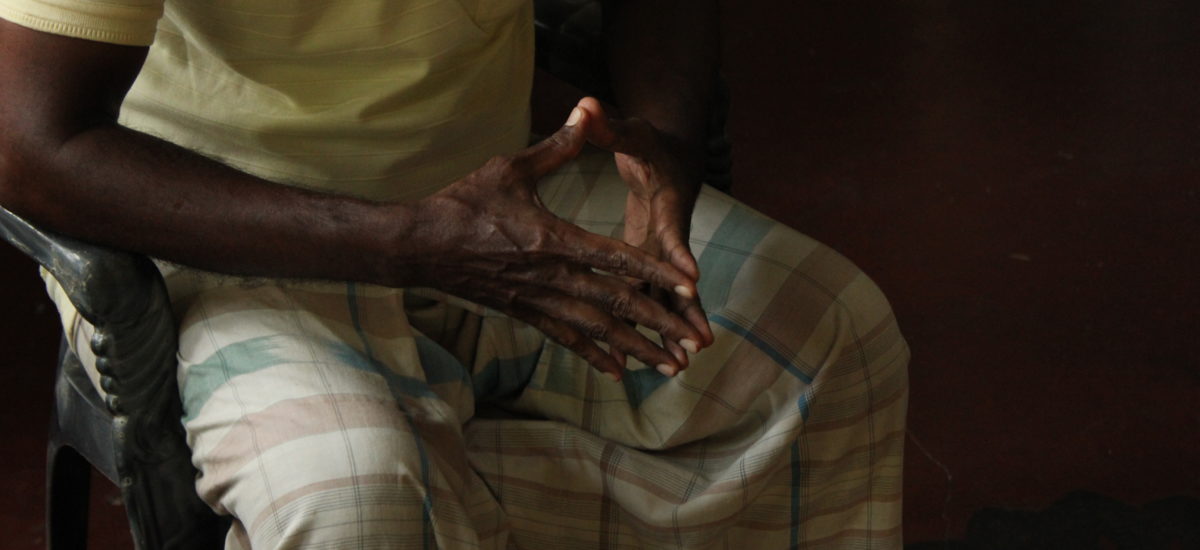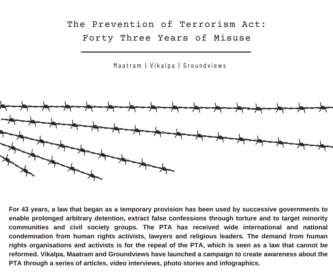In the decades of its use, the Prevention of Terrorism Act (PTA) has been condemned for being an unjust and arbitrary law. The suffering of those detained under the PTA and the impact on their families have been documented by international and local human rights organisations and in the media. Abu Saleem and his family have felt the full force of the PTA; detained for 18 months, Saleem lost his job, was absent from his children’s lives and faced abuse and harassment from his own community. He is still in pain from the severe beatings he received in custody and remains in limbo as his trial drags on.
Abu Saleem, 47, and his wife Razia, 44, (not their real names) are from Mannar but they now live in Kalpitiya. In 1985 his family fled by boat to India where he spent five years in a refugee camp. In 1990, he came to Kalpitiya with his sister and began working with several international and local NGOs, overseeing projects that served the marginalised and displaced in the north and east. In 2014, he began a job for a local organisation as a manager in its Colombo office while his family remained in Kalpitiya. He never earned much from his jobs but it was enough to find a modest house and send his four children to the village school. They managed to grow a few vegetables and fruit trees in the sandy soil of their garden.
It was not an easy or comfortable life, travelling many hours back and forth and seeing his family only at weekends but they got by until Sunday, May 3, 2020 when their world was turned upside down. It was during Ramadan and just before the breaking of the fast. Five men in civilian clothes came into the house and, without showing their identification although asked to produce it, insisted that Saleem accompanied them to Colombo for questioning by the Criminal Investigation Department (CID). They searched the house and took some documents, two phones, his passport, ID card and laptop. Reluctantly, he climbed into the waiting jeep, handcuffed, with only the clothes he was wearing because he expected to return the same day. The men gave his wife a letter in Sinhala, a language that she could not read, saying they had taken her husband for questioning to Colombo. His young daughter was frightened and started crying.
“I knew I had done nothing wrong. I had not taken part in any illegal activities,” Saleem says. The reason for Saleem arrest was his job at the local charity funded by Sri Lankans to uplift the lives of poor children by helping them to go to school and find ways of earning a living instead of resorting drugs and crime. Also helping in the organisation was Hejaaz Hizbullah, a respected human rights lawyer. On April 20, 2020 Hejaaz had been arrested under the notorious Prevention of Terrorism Act (PTA) and the CID was now busy looking for evidence against him. After Hejaaz was arrested, Saleem knew there was trouble ahead and returned to Kalpitiya, only to be taken into custody himself.
On the way to Colombo the jeep stopped in Madurankuliya where the organisation had an office room, which the men searched. The men in civilian clothes were joined by two policemen in uniform from the nearby Mundal police station. The media turned up to capture the arrest of this “terrorist”, supposedly linked to the Easter Sunday attacks of April, 2019 that killed 253 people in churches and hotels in Colombo, Negombo and Batticaloa and injured another 219 people.
Reports in the media after Saleem’s arrest claimed that suicide bomber and alleged mastermind behind the attacks, Zahran Hashim, had conducted lectures on extremism at the office in Madurankuliya and also that Saleem had organised weapons training at the site. He denies these accusations. “There was nothing like that,” he says.
They arrived in Colombo at midnight going to the organisation’s office at the Mattakuliya mosque building. Again, documents were taken along with vouchers, bills, leaflets and cheque books. Then on to the CID office in Fort where Saleem was photographed again, fingerprinted and body searched; he underwent questioning for several hours, grilled about his organisation’s involvement in any extremist activities and Hejaaz’s supposed links with ISIS. They even took away the Rs. 500 he had in his pocket for the bus journey home.
The next day Saleem was handed over to the Terrorism Investigation Department (TID) and taken to the second floor of the CID building. Saleem asked the police inspector why he could not go home and received a slap in answer. He was told he was under arrest because of the activities of his organisation.
“They asked me the same questions I had been asked at the CID – if the organisation was involved with ISIS. I said I didn’t know anything about that. Then they asked me about Hejaaz. They told me that if I said that Hejaaz was involved with ISIS, I would be free in three days. I refused.” Saleem was adamant that he would not implicate Hejaaz with false testimony. “He is good person so I didn’t want to get him into trouble,” he explains.
Then came the merciless beatings that still cause severe pain and anxiety in Saleem. “Three people beat me, hitting my spine and with their elbows. This went on for several minutes. One man kicked me with his shoe. I was still handcuffed. I told them I can tell a lie now but I will state in court that I lied. My religion says I can’t lie,” he points out.
Saleem spent the next 13 days sitting in a chair with one hand handcuffed to a table. The handcuffs were not removed at night. Since he did not have his own clothes, the others in the room gave him a sarong and T shirt to wear.
In a bizarre scenario, Saleem and four others arrested under the PTA were kept in an office room amid people working during the day at their administrative duties. The questioning and the beatings continued for three days. Saleem was then taken to the sixth floor where he was put in a large room with about 23 people – those arrested under the PTA together with those accused of murder, robbery and other crimes. They were kept in separate cells but there was no mat to sleep on. Saleem asked his cousin to bring him some clothes and a mat; pillows were not allowed.
After four months Saleem was shifted to the old prison in Tangalle where he was kept with 96 others most of whom had been arrested under the PTA as LTTE suspects or ISIS.
Saleem spent more than a year in Tangalle, far away from his family. He told his wife not to visit him because of the long journey and the cost of travel for her and their children. His cousin, a fisherman, could not afford to lose two days income by coming to see Saleem from Mannar. He was allowed to speak to his lawyer only on the phone.
From Tangalle, Saleem was sent to the Welikada Magazine prison in late October 2021. Here his cell was between two mentally disturbed people. “They were shouting and crying day and night. I could not sleep and I became very upset. I received some pills for my pain but that was all,” he says. On the 27th of October, he was produced before the Kotte magistrate, where for the first time since he was arrested, Saleem met his lawyer. However, all conversations were closely watched and heard by the ever present policemen. His lawyer argued in court that Saleem had been tortured and needed hospital care, requesting for bail. The judge seemed sympathetic and amenable to bail but then a policeman handed him a note to read and the judge ordered Saleem to be placed in remand. The judge however recommended medical treatment.
He was taken to the Welikada prison hospital for a week and returned to the magazine prison to a big room with 70 others where he spent the next six months. “Although they were criminals, the people were very nice and helped me. I got some books to read from the prison welfare centre. The food also was not too bad,” Saleem says. He was able to take calls and over the phone, saw his children’s faces for the first time since his arrest.
Every 14 days he had a skype call with the judge. Many times his hopes of bail were raised only to be dashed. Finally, on April 8, 2022 his lawyer paid his bail and after signing documents and getting back his possessions, Saleem was a free man for the time being. His next court date is in November. He is planning to file a fundamental rights case. “The maximum they can do is to kill me. I have undergone all the suffering I can bear. I have lost my prestige. Physically and mentally my life has been affected,” he says.
For Saleem’s wife Razia, the past two years have been ones of anxiety, dread, shame and despair. “I felt shame when other people asked why my husband was in jail. My children didn’t go to school because their father was in prison. At night we were scared to be home alone,” she explains. Razia says people also looked on her with suspicion. In the village they said weapons and gold were found in their house and that they have taken a photograph in Zahran. Razia spent the two years fearing the worst, thinking that something may happen to her husband.
For Saleem, it was important that his children knew the truth. “I told my children very clearly that I was not involved in any illegal activities. I told them it was important for them to study and not to worry, that their father had not done anything bad.”
Now the children have gone back to school; they missed their father and are happy to have him back at home. Life has settled down somewhat but Saleem is still facing difficulty in his new place of work since CID officers have been visiting to ask questions. His bank accounts have been frozen so he is unable to get his salary deposited in the bank. He cannot travel abroad to work without his passport. He still suffers from crippling back pain and is receiving treatment at the Kalpitiya hospital.
“In the past two years I have faced many problems, issues and violence so nothing worse can happen. I can face it even if I am sent back to prison. I just worked with the organisation and I have no connection with terrorism,” he declares.
“Under the PTA, innocent people have been arrested. They are told to sign confessions so they can be released or they are threatened that their wives and children will be arrested. I have seen many people who were beaten and tortured; I tended to their wounds.
“The PTA is an unfair law. Without evidence people are being arrested and after that the police manufacture the evidence. The grama sevaka knows who I am, the local police know me. All the police have to do is ask them about me from them, if I have done anything illegal,” he says.
As to what will be the outcome of his case, Saleem shrugs and smiles, “I don’t know,” he says.



